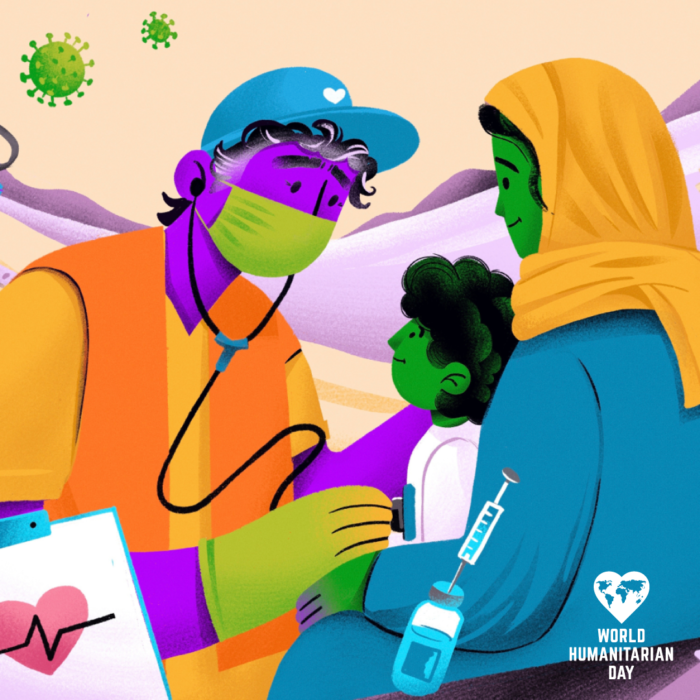World Humanitarian Day: It Takes A Village To Reach Health Equity

By 2030, it is estimated that 1.9 billion people will live in fragile and conflict-prone settings and face a wide range of severe threats to their health and well-being due to epidemics, pandemics or new diseases, natural disasters, and situations of conflict and war.
An increasing number of people need humanitarian assistance – up from 1.4 billion in 2021 to 1.9 billion in 2022.
World Humanitarian Day (WHD) is a global celebration of people helping people. Whenever and wherever communities are in need, there are others who help them. They are the affected people themselves – always first to respond when disaster strikes – and a global community that supports them as they recover.
The 2022 WHD campaign shines a light on the thousands of volunteers, professionals, and crisis-affected people who deliver urgent health care, shelter, food, protection, water, and much more.
The World Health Organization’s (WHO) personnel is uniquely positioned for such challenges. Their unique global reach, technical expertise, and broad range of partnerships allow them to respond rapidly and at scale, moving people, resources, and supplies to where they are needed the most during health emergencies. WHO ensures prevention, preparedness, readiness, response, and recovery in emergency situations.
The WHO Foundation in support of the World Health Organization
The need to fund health emergency preparedness and response is now greater than ever. The WHO Foundation combines the power of the private sector with the reach of the WHO to drive innovation and impact. Together with our partners, we invest in opportunities to promote health, improve health systems, and respond to emergencies.
In 2021, amid the COVID-19 pandemic and its aftermath, WHO responded to 76 health emergencies, from acute crises in Afghanistan, DRC, Ethiopia, and Tonga to multiple outbreaks of cholera, yellow fever, meningitis, and Ebola, to protracted emergencies in Syria, Yemen and Cox’s Bazar.
Most recently, WHO focused on crises like the Monkeypox outbreak or the war in Ukraine.
Despite nearly 450 incidents and attacks recorded on healthcare and many displaced in the health workforce, medical staff still work tirelessly in Ukraine and the refugee-receiving and -hosting countries. As a result, as of June 2022, 1 253 000 patients were treated with interagency emergency health supply kits, 310 000 people with chronic health conditions such as heart disease and diabetes were supported with Non-Communicable Disease (NCD) kits, and over 11 800 consultations by mental health and psychosocial support services were supported by WHO.
In other parts of the globe, WHO also issued emergency appeals highlighting urgent response priorities to improve access to essential health services for millions of people in areas affected by the humanitarian crisis in the Sahel and the Greater Horn of Africa. These regions are facing unprecedented humanitarian needs due to armed conflict, food insecurity, extreme climate events (drought & flooding), diseases, socioeconomic effects of COVID-19, political instability, as well as volatile food and fuel commodities markets.
With local authorities, partners, and community leaders, WHO staff on the field work day and night to ensure health interventions are inclusive. They support vaccination campaigns in remote communities, provide mental health care, reproductive health assistance, epidemic surveillance intelligence, and NCD care to people who need it most.
Over the five-year period (beginning in 2021), the WHO Foundation aims to contribute $100 million to WHO world health emergency response and preparedness initiatives.

We marshal funds to support WHO’s Health Emergencies Programme as it :
- Ensures funding for preparedness, readiness, and proactive measures to diminish public health risks in countries with particularly high vulnerability and fragile systems;
- Provides predictable funding for unpredictable emergencies through the Contingency Fund for Emergencies, acting as a first response mechanism unlocked within 24 hours or less in any emergency situation; and
- Provides life-saving health services to affected populations in countries and regions with acute and chronic emergencies.
To enquire about our partnership opportunities, please visit our website and get involved.

